#to not harm a community. to not be ableist. what are they doing to learn and actually grow.
Text
also while im having my afternoon bitching moment i think a lot of analog & common horror games relies on being ableist and having the 'scary disfigured person' trope that harms actual people, even if it isn't the creators intent. if youre old enough to publish actual games youre old enough to get some perspective on how you may be hurting others—especially when it comes to horror and using disabled bodies as a visual meant to horrify people.
#i went to bed at 5 am with a spiraling mood and woke up at 9 angry and now it's noon and im just solidly annoyed and carrying a bad migraine#but im so tired of people just getting a 'well they didnt know better!!!' like okay but what are they doing to actually educate themselves#to not harm a community. to not be ableist. what are they doing to learn and actually grow.#why are people so quick to defend ableism and make us the mean disabled people. why is that your first instinct.
39 notes
·
View notes
Text
able-bodied neurotypical people want quiet disability. invisible disability. they love it when we don’t complain and don’t shove our needs in their face. they love it when we stay home and die quietly instead of trying to live (but they don’t like it when we stay home and need caregivers).
[paragraph about self then next ones on more general and important things] i recently realized that i make many people uncomfortable irl because i talk about my symptoms. i wasn’t aware it was wrong, because i’m autistic and struggle a lot with notions of public vs private space, and what can be said to whom. i’m very open about my disabilities and struggles, both because i don’t realize i’m saying something i shouldn’t, and because i don’t have a choice and often can’t mask (i am not high masking. not low masking either tho). i don’t wear unnoticeable noise cancelling headphones, they’re not good enough for me at all, i wear big obvious ear defenders with a fluorescent part. i sit down on the floor of a store if my legs hurt. i don’t sit normally anywhere, including at school, because i can’t, i can’t sit correctly and not move, it’s painful. i don’t hesitate to tell people i have terrible executive dysfunction. i openly say i am in pain and need to rest, even if it’s abnormal for a teenager to not have a healthy strong body. when it seems relevant to the conversation, i share the fact that i struggled with an eating disorder and self harm and that i recovered/am recovering. when someone asks me how i am doing, i tell them i’m feeling terrible because i am in pain or because i am suicidal or because i am overwhelmed— this is partly a choice to be open about my disability, partly the fact that i don’t notice until it’s too late that they don’t want me to be honest, and party the fact that there are many things i cannot hide. i tell people that i am not independent, can’t cook, can’t go to new places alone, can’t shop, can’t maintain hygiene and that i don’t shower enough or brush my teeth regularly. when someone asks if i plan on learning how to drive i say that i don’t want to right now because my processing issues would be dangerous and i would get in an accident. i tell people i have meltdowns and shutdowns at school. i hit myself in public sometimes.
yet i am not visibly disabled. i’m very lucky and privileged within the disabled community. i am visibly weird and there is visibly something wrong with me but i am only visibly disabled to someone who spends some time with me and sees me unable to process informations or unable to do IADLs. strangers don’t know i’m disabled until i tell them— they mock a symptom or ask why i can’t do something and i say i’m autistic, i’m disabled, i’m in pain. and they already hate that i tell them. they say it’s private. they say my struggles are something personal. something to talk about with doctors but that no one else should have to know about.
some people are way more disabled than me, visibly disabled, disabled at first glance. some use mobility aids, full time or not. some have intellectual disabilities, some use an AAC device, some have a physical disability that cannot be concealed or an intellectual/developmental/mental disability that very obviously affects the way they move or communicate. some people don’t have a choice to mask or not to mask, don’t have a choice to be visibly disabled or not. strangers will immediately notice that these people are disabled, even without engaging in a conversation with them. and they hate it ! disabled people are supposed to be quiet and invisible and going outside with ear defenders or a mobility aid or anything, no matter if it is a small or a huge accommodation, is too much. but the bigger it is or the more you need help to do a ‘basic, easy’ thing, the worse it is. they stare at me in the street because of my ear defenders, but they don’t just stare when someone is in a wheelchair, they touch and break and don’t have any respect.
ableists think disabled people shouldn’t be in their way because they think we shouldn’t exist or that we are worthless. having an accommodation or an aid in public is already activism for them, already disturbing, already forcing them to see that they are privileged and that the world is not accessible.
to exist as a disabled person is beautiful. it’s brave. it’s something to be proud of. not because it’s inspiring that you are strong enough to live with your disability, not because "someone else would have killed themselves already in your situation," not because "i could never be like that ! you’re so courageous !", but because ableism is everywhere and it’s so hard to live in this world where they don’t want us to exist. it’s so hard to advocate for ourselves.
and for those who are not visibly disabled (like me), or at least not always ; for those who have low support needs ; for those who know how to mask : point out inaccessibility. force people to see their own ableism. make them uncomfortable. it’s also our job, our responsibility. if someone mocks me and calls me useless because i can’t do IADLs i say i’m disabled, stay very calm and inform them that many people are unable to perform BADLs without help and that they deserve just as much help and respect as anyone else. if someone points out how annoying my ear defenders are i ask why the place isn’t accessible for people in a wheelchair. etc etc. listen to people with higher support needs than you and amplify their voices. but also act irl.
we can all do better and force society to be better to.
and remember that accessibility for you doesn’t mean accessibility for everyone.
a place that accommodates sensory issues might not have accessible toilets. so it’s not good enough. an autism support group meeting has stim toys and ear defenders and happens in a quiet place ? that’s wonderful ! can a nonverbal person participate ? are caregivers welcome ? we can’t just think that "something is better than nothing." yes it is, but it’s not good enough. if a place or an event is accessible for one thing but not for something else, then it’s not accessible. and we need to be loud about it.
#disability#disabled#disability community#support needs#ableism#internalized ableism#fuck ableists#disabled tumblr#disability advice#autism#actually autistic#autistic#chronic pain#mentally disabled people support physically disabled folks#low support needs#middle support needs#high support needs#physical disability#disability advocacy#disability accommodations#disability accessibility#disability awareness#disability acceptance#disability activism#neuropunk#madpunk#disabled punk
724 notes
·
View notes
Text
Intelligence Doesn't Equal Morality
Intellect is rooted in ableist systems and stupidity and intelligence are pointless social constructs that don't relate to morals or character.
I try to be a pretty good person, I fight for human rights, I regularly engage in mutual aid, and I care for my community. I try to do the right thing and support causes I care about and make positive changes in the world.
But I also am not very smart. I have several neurodevelopmental disorders, as well as cognitive disabilities. I can’t do simple, basic math, it’s hard for me to remember facts or algorithms, I rely entirely on spellcheck and speech-to-text to write, I failed many classes in high school and I barely passed with a low GPA, I had low pSAT scores and I never took the SATs. I moved around a lot all through school starting in third grade, and I missed a lot of basic fundamentals in learning (like how to do division and multiplication) so when I went to a different school they had already passed it and expected me to know. After my TBI, I could barely read AFTER I was cleared from my “concussion” symptoms because letters and words would flip around and I’d get headaches. Which still happens sometimes.
A lot of people see me as smart because I've learned a lot of academic language and can formulate thoughts into cohesive posts. But I lack a lot of necessary skills and rely on my caretakers to assist me. Things like budgeting and planning are extremely difficult for me. If I need to do simple addition or subtraction, even with a calculator, I quickly get confused and struggle. I forget basic information about myself all the time, let alone other subjects. I'm talking, has to check my ID for my birthday type confused. Doesn't know my name or address or what year it is confused. It happens daily, sometimes multiple times a day. Being able to type out posts like this often takes weeks and many adaptive tools to get there. Focusing is extremely difficult on many fronts, severe chronic pain, ADHD, dissociation, fatigue, migraines, and TBI, are just some of the contributing factors. I struggle daily with many things because of my lack of intellect.
I’m also privileged in the fact that I had some access to education as a homeless youth, that I had some supports in place to help me (towards the end of school), that I was somewhat able-bodied at the time and could walk or bike to and from school when the school system didn’t provide transportation. I was fortunate to have a chance to succeed, and I’m proud that I graduated high school because it was a difficult task for me, and others often aren’t offered that chance or get accommodations. I almost didn’t and I dropped out many times before graduation. I passed on sheer luck and what little privileges I had.
That all being said, me being stupid (reclaiming it here) doesn't make me a bad person. I don't hurt people because I can't do math. I may mess up things or get confused but it doesn't make me want to harm others.
We often (wrongfully) equate morals with intellect. Being ‘stupid’, ‘dumb’, or an ‘idiot’ doesn’t automatically make someone a bad person. Plenty of evil, awful, and abusive people are extremely intelligent.
I see this most notably with people advocating for IQ tests to be able to vote. Often from left-leaning people, in hopes it'll make the right (that they view as unintelligent), unable to vote. The reality is, it just hurts some of our most vulnerable members of the community while not actively doing anything to restrict some of the most dangerous members of our community-- those who know what they're doing to harm others and deliberately doing so. My voice matters, and I speak up against injustice and participate in dismantling oppressive systems. Taking away my right to vote won't make the right stop oppressing minorities (which also puts a lot of faith into the two-party voting system, which is a post for another day).
Additionally, legislative measures that discriminate against intellectually disabled people such as IQ tests for voting are also rooted in racism and classism.
Yes, education can be a vital tool when it comes to addressing discrimination and creating safer communities. But the kind of education that is measured with an IQ test (or any test) isn't the same. Building compassion and caring for others can (and should) happen at any IQ level. We can all practice this, we can all participate.
It harms our communities and stagnates our progress when we equate intelligence with high morals.
#disability#chronically couchbound#disabled#disabled pride#disability pride#cripple punk#cripplepunk#intellectual disability#neurodevelopmental disabilities#cognitive disability#brain fog#adhd#audhd#autism#neurodivergent#neurodiversity#actuallyautistic#autistic#neurodivergence#tbi survivor#iq test#voter rights#ableism#chronic pain#dissociation#dissociative identity disorder#dissociative amnesia#amnesiac#IQ score#Low IQ
1K notes
·
View notes
Text
Dear teenagers on tumblr, and a whole bunch of adults, too:
You can be any identity under the sun, and that does not stop you from being bigoted or hateful towards other people of that identity or any other.
Being gay doesn't magically mean you can't be homomisic or anything else.
Being aspec does not mean you can't be amisic or anything else.
Being trans doesn't mean you can't be transmisic or anything else.
Your identity does not determine how harmful or hateful your actions and words are. There is no identity in the world that gives you a free pass from biotry and cancels out all the harm you do.
"But I can't be an exclusionist, I'm literally aspec!" is a completely meaningless statement. I know not everyone remembers, or was even online during the aspec harassment campaign, but a ton of alloaces and alloaros were onboard with the whole thing and throwing the "non-Queer aces and aros who make us look bad" under the bus.
Their asexuality or aromanticism did not magically make their actions not violently and horrifically amisic.
Being part of an oppressed minority does not make all of your actions harmless and innocent, and it does not mean that anyone who criticizes you for bigotry against other people from that minority group is just "stupid" and needs to "touch grass".
You being [insert identity] does not mean that it's impossible for you to hurt, or be hateful towards other people of that identity.
If someone tells you that something you are saying is harmful and bigoted, and that there are better ways to phrase what you're actually trying to say, you cannot respond with "I'm literally X identity you stupid idiot, do you think I hate myself??" or pretend that the people telling you it's harmful are just "making up problems to get mad about" and "need to touch grass" and "looking for things to be offended by"
You cannot repeat the exact same words any random conservative would be saying and call yourself progressive and say you're acting in good faith and have good intentions.
If you actually want you make yourself and your blog a supportive place for your community, then you need to learn that it is not okay to respond to people telling you something is hurtful by just repeatedly insulting them and saying they're just looking for problems to cause and you've done nothing wrong because "I'm literally X identity I can't spread hate about my own identity".
Because yes you can. And you are.
If multiple people are telling you you're acting like an exclusionist, that is your cue to stop, take time to calm down your immediate negative reaction, and listen properly.
Do not just immediately leap to repeating exact conservative talking points by accusing people of "looking for things to get offended by".
Do not immediately leap to insulting people's intelligence and other ableist things.
If you are actually acting in good faith, and you are actually trying to be a supportive member of your community, then you have a personal responsability to listen to other people in your community when you are told that something you've done or said is hurtful and is perpetuating harmful, exclusionary beliefs.
You are not immune to being a bigot just because you're also a minority.
You have a personal responsibility to listen to people when they tell you you are doing something harmful.
You have a personal responsibility to unlearn bigoted thought patterns and behaviors like immediately dismissing any criticism as "special snowflakes getting offended by everything".
You have a personal responsibility not to harm your own community.
Everyone needs to learn this lesson at some point. You will either learn it now, when you're young, or you'll learn it when you're older and you've already driven people away from you.
Either way, you gotta learn it.
You cannot repeat conservative bigoted talking points and keep insisting your intentions are good.
If you actually want to be a good person who supports other minorities, you have to learn to act like it. You have to learn to listen when people tell you you've done something harmful. You have to learn to listen when it is explained that you are repeating exclusionary talking points that harm the community.

[ID: A screenshot of a post by dulce de calabaza / zapatistarising, that reads, "There's actually no political label or identity that absolves you of doing harm". End ID.]
I suggest you try learning it now while you're still young, before you've driven your community away from you with your hateful behavior. No one likes a bigot.
And no one wants to hang out with someone who immediately starts insulting people and all but calling them special snowflakes when they're told they've said something bigoted.
#Queer#LGBT#MOGAI#ILGBT#ILGBTQA+#Gay#lesbian#trans#transgender#nonbinary#aromantic#asexual#aroace#aspec#arospec#acespec#bi#pan#mspec#poly#omni#achillean#sapphic#allyship#solidarity
71 notes
·
View notes
Text
More thoughts on the recent snzblr discourse. I will try my best to be understanding and levelheaded about this, but this topic is very personal to me so forgive me if I’m not entirely able to.
I will start by saying that it is not “purity culture” or “moral panic” to say that having this kink does not excuse intentionally infecting unconsenting individuals with illness. There is a MASSIVE difference between enjoying a kink in a consensual setting or fantasizing about it (no one is saying you can’t do these things, you are not being shamed for your fantasies / desires!) and actually involving unwilling individuals in your kink.
Consent is the #1 most important thing in all kink spaces. Like yes we are all here for the same reason, and there may be a propensity to feel defensive if you feel you are being kink-shamed in what is supposed to be a space for us all to be as open and loud and unabashed about our desires as we want, but it is still absolutely crucial to delineate between what is fantasy and what is reality, and understand that our real life actions can and do have consequences. We are not living inside a sickfic, the ways in which we choose to engage in our kink MUST be consensual, respectful, responsible, and safe. It is the bare minimum for this, or any kink space.
It is not kink-shaming to say that non-consensual engagement is wrong and unethical, ESPECIALLY when it comes to something as potentially dangerous as illness. It’s also worth acknowledging that the dynamic of our community has been greatly impacted by COVID, just by the nature of what the kink entails, and that this sucks and is worth mourning, but just like with many other things the pandemic has impacted, we cannot hang on to this old way of being when it no longer is safe or realistic to do so. This is the way things are now, and it sucks, but we can still find SO much enjoyment and gratification and pleasure in the way things are now.
If you are feeling discomfort, if the points disabled people are bringing up around this topic are making you question yourself and your actions, that is likely something for you sit with and explore yourself, rather than trying to debate with disabled people on whether or not their reaction to inflammatory, ableist content is “moral panic”. Understand that this conversation is part of a much, much larger picture and that it is not isolated to just our community, but rather a reflection of a larger systemic response in which disabled people have been disbelieved, undermined, and discarded when it comes to our rights and safety during an ongoing pandemic.
If you didn’t read as much into *that* post as some of us did, great. You likely don’t have to be on hyper alert for this kind of content, but we see it all the time, everywhere. The casual downplaying of COVID and the flippancy about its risks are things we are all too familiar with, and tone policing marginalized folks when we get upset about harmful content is not the move. Listen to us, learn from us, be in solidarity with us. It may seem counterintuitive to you to care about these things in what many of us may see as just a place to escape and have a little fun, but respect is the backbone of kink spaces and we’d all fare well if we could remember that.
This was longer than I planned on it being, oops. I also blocked some people so I don’t even know who will see this but just wanted to add my piece. Love y’all bbs, stay safe ❤️
147 notes
·
View notes
Text
to set the record straight, as I have zero things to hide.
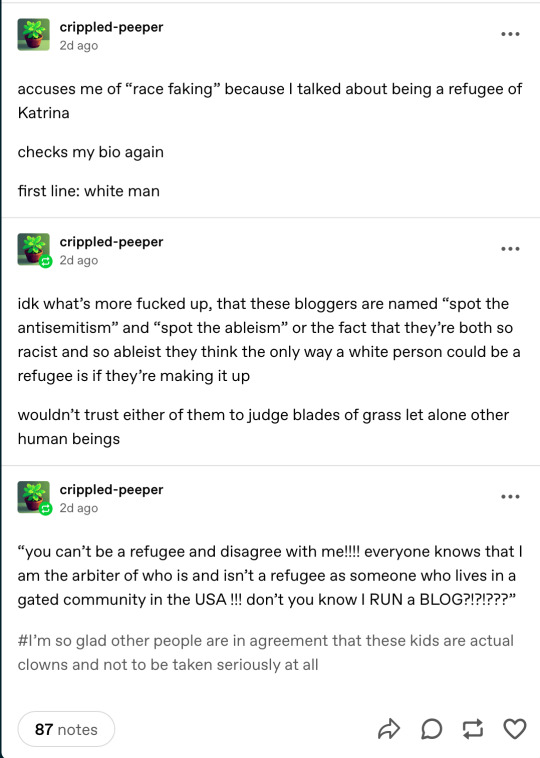
[IMAGE ID: a tumblr post by user crippled-peeper, it is a reblog chain of 3 posts. It reads “accuses me of “race faking” because I talked about being a refugee from Katrina checks my bio again first line: white man” next reblog reads “idk what’s more fucked up, that these bloggers are named “spot the antisemitism” or “ spot the ableism” or the fact that they are so racist and ableist they think the only way a white person could be a refugee is if they’re making it up” next post reads “ “you can’t be a refugee and disagree with me!!! Everyone knows that I am the arbiter of who is and isn’t a refugee as someone who lives in a gated community in the USA !!! Don’t you know I RUN A BLOG?!?!?” The tags read “#I’m so glad other people are im agreement that these kids are actual clowns not to be taken seriously at all” END ID:]
I never said or insinuated that you were not a climate refugee, nor that you were a racefaker
above is proof, I have not edited the posts nor want to. You have the reblogs to prove I in fact did not edit anything.
the things you are claiming I “did” were things that spot-the-antisemitism did and said.
intracommunity ableism is still ableism, hate speech against both Jewish and other disabled people is not okay, you can be both completely totally right to call out spot-the-antisemitism’s ableism and commit hate speech against random Jewish and disabled people. You can do both, nuance exists.
me calling you out on harmful behaviour and inciting hate speech is not a bad nor immoral thing I’d hope you would do it to me.
Link 1
Link 2
Link 3
Link 4
if you are mad at me swearing at you may I remind you that you have committed way worse acts of hate speech and yet I gave you benefit of the doubt. People are allowed to swear at people.
i have said you may be having a horrible time right now due to medication troubles and that people should not harass you regardless. And that they should keep in mind that you have been through a lot and do not want harassment. I do also humbly apologise for swearing it was wrong of me to and not conducive to anything helpful.
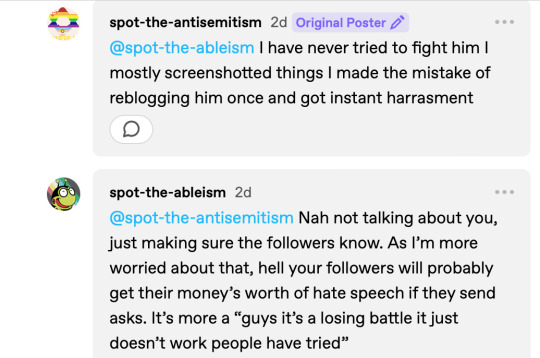

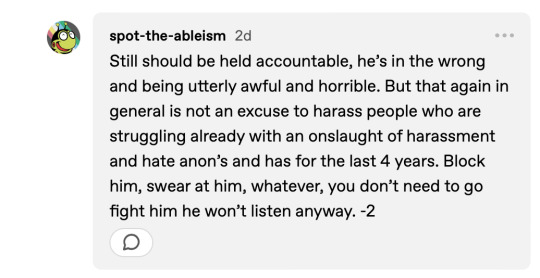
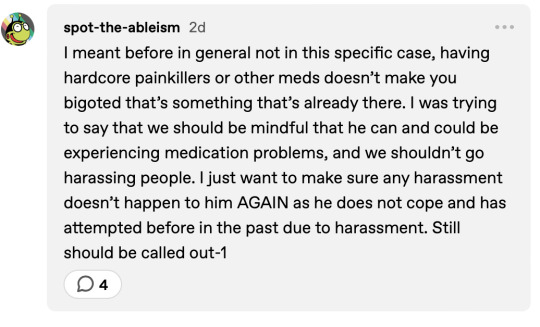
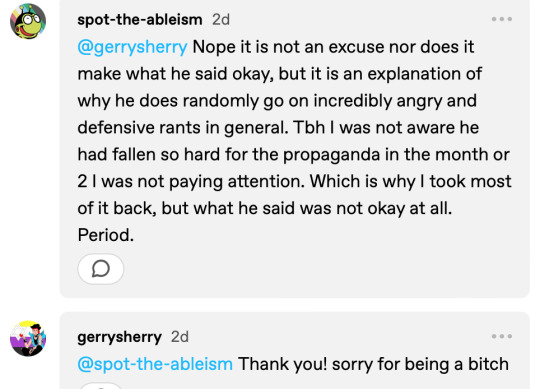
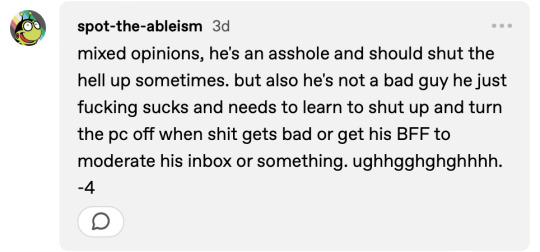
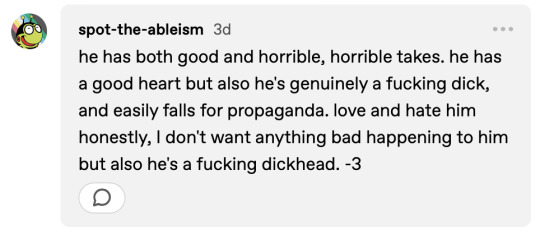
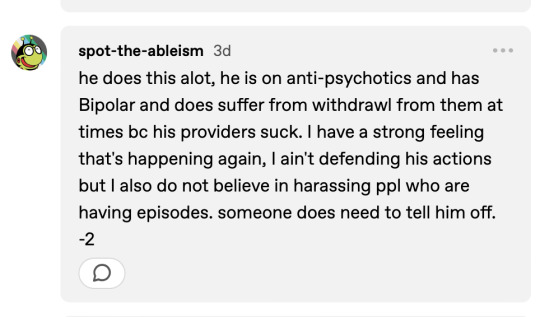
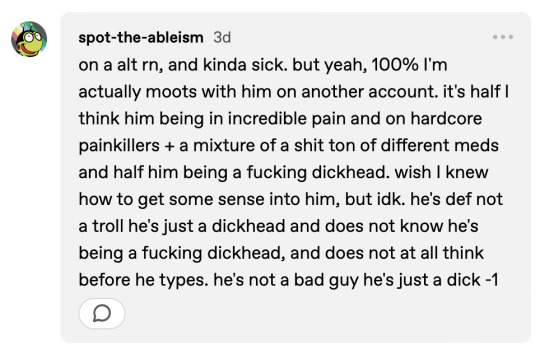
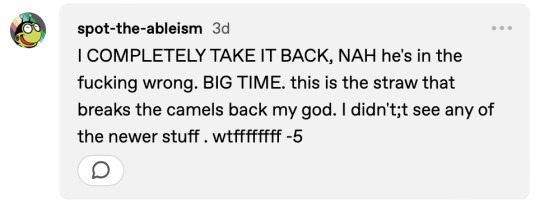
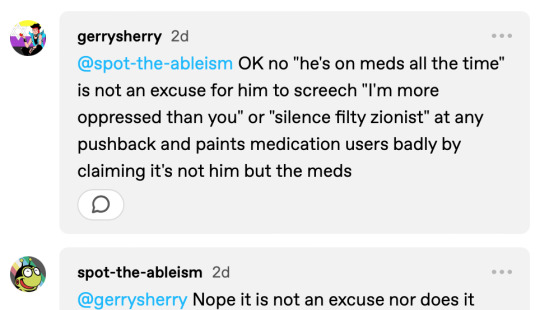
if anything I have been way too forgiving, what you have said to many well meaning and non-ableist/normal disabled people has been utterly vile and yet do I use that against you? Yet do I say those same things towards you? Yet do I mean to hurt or harass you? No.
I live my life, you live yours, I care about you enough to actually call out people who do wish to hurt you. I shouldn’t, but I do. If you return my very calm and sincere response with the same energy and hatred that you usually do it is not in good faith.
you are having a hard time, a hard time always. And I do not wish to contribute to that. But I cannot stay silent and let others be hurt by what you do and you say. Words do effect reality, there are people behind these screens and I am one, and I am writing this sincerely.
again why am I ableist when I was the one to in fact call out and hold spot-the-antisemitism accountable, and explain why it was bad? I spotted the ableism, simple as that.
I am no wimp, or coward if you wish to call me horrible things I am proud to Bare it.
As I do with all things.
sincerely a disabled person who was told way worse things than this over the course of my childhood.
if you do say "KYS" or any variation of it I will be reporting you.
as that. is. hate. speech. and violent speech which. is. not. legal.
I have not discriminated against you nor malgendered you, I have only sweared at you at the worst (and called out that fakeclaiming and spewing violent hate speech is unacceptable), if anything I have been on your side on most of this.
this comes from a place of love, not hatred.
#ableism#cripplepunk#spot-the-ableism | important info#The crippled-peeper saga#context and my thoughts#if you wish to say something about me I would rather it not be swears#I am already at my wits end due to real life things. and will not accept any violent or hateful speech.#I am not a “zionist” I am not a “genocidal murderer who hates brown refugees” I am not anything.#if you wish to take it up with me I will be getting the moderators involved.#thank you. I know my rights.#not screenreader safe
21 notes
·
View notes
Text
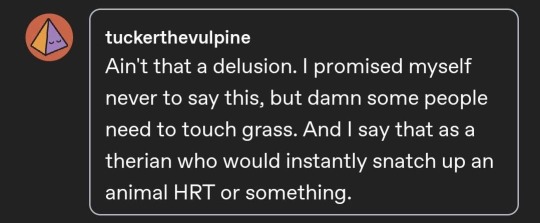
I tried to tag the commenter but the blog doesn't show up, so I can't. TW: this post does contain what could be interpreted as reality checking and although I don't mean any harm, this could potentially be triggering!
But anyway, this requieres a longer answer - I'm gonna give them the benefit of the doubt and just assume they just don't know better, which is fine, we're all here to learn. So please don't read an attack into this! I also do not experience delusions myself and certaimly don't want to speak over those who do. I am doing my best to be respectful and not accidentally spread misinformation, but if I mess up, please let me know!
Firstly, "delusion" is not a bad word. a delusion isn't "somethign stupid someone believes in, what the fuck is wromg with them", it's a (symptom of) a serious mental illness, often seen in schizophrenia and psychosis. it's an unshakable belief that contradicts Reality (= in this post, Reality with a capital R refers to the reality that is generally shared by all people and can be seen and experinced by everyone - aside from those who may have delusions). "touching grass" won't do anything to help that, it is reality for them and absolutely nothing and nobody can change that. at worst, telling them they're wrong and should just "touch grass" will make them suffer even more.
so, yes, you could say that all p-shifters experince delusions, because nobody but them can see their transformations. at least, there hasn't been any proof at all until today and their beliefs absolutely clash with science and Reality. but here's the thing: there is a condition called clinical lycanthropy or clinical zoanthropy, which describes exactly the experience of believing you can, have turned or will turn into an animal. there are quite a few of them here on tumblr, having their own community which also often kinda overlaps with alterhuman spaces. those people are not p-shifters! p-shifter is not a medical term or anything, instead it is a term that has evolved here on the internet and has a history of cult-like behaviour, lots of manipulation, malicious people, etc. the "original" p-shifters also oftentimes had a lot of ableistic opinions, openly shitting on clinical zoanthropes, using delusional as an insult, etc. the term p-shifter was never ever meant to describe the experience of clinical zoanthropy. it was invented to create the feeling of belonging to an elite group, to put yourself over others. it's even questionable if the majority of p-shifters actually believes they could transform or if they just wanted power over others, promising them to teach them how to turn, knowing all to well it can't work.
nowadays, some clinical zoanthropes try to "reclaim" the term p-shifter - which is a problem, because you can't just take a term that was NEVER meant to describe your experinces and also never used as a slur against you. a different example in alterhuman context would e the word kinnie - originally made by trolls and to shit on otherkin, it always directly addressed otherkin, even if in a deregatory way. it was meant to be used for otherkin. p-shifter was never meant to be used for delusional people. p-shifter will always have its ties to manipulation and cults, it will always be a harmful term.
I don't and will never allow people who call themselves p-shifters on my blog, because of the terms roots.
there is nothing wrong with truly believing you can transforn into an animal, even tho it contrdicts Reality. there is absolutely nothing wrong with being delusional (as in, it doesn't make you a bad person, of course it almost always comes with suffering). there however IS something wrong with proudly using a term that was NEVER meant for you, never described your experiences and instead has a history of manipulation and online-cults. if you proudly call yourself p-shifter and just basically decide to ignore that history, I don't trust you.
THIS is what my post was about, not about the fact that some people are delusional.
53 notes
·
View notes
Note
So, I really like body horror and horror in general, but I’m also physically and mentally disabled, and I tend to notice a lotta ableist/eugenicist folk flocking to the horror genre. Do you notice that too? Or am I just like, paranoid?
Also, do you have any suggestions for horror movies (especially body horror ones) that AREN’T oozing with Hollywood flavoured ableism? Would really appreciate it bc I’ve been getting so dispassionate about the genre lately thanks to certain kinds of fans.
i don't think you're paranoid, there are definitely people who engage with horror in ways that can have ableist implications and be very upsetting if you actually experience those reactions to your own conditions in real life, because for you it's not just fiction, it's your lived experience. the line between horror and ableism (and other forms of bigotry, like homophobia, transphobia, racism, etc.) can be a very fine one, and it's important for people who enjoy horror to be self aware and willing to listen. and at the same time, there are disabled people (and queer people, and people of color, and people from all kinds of marginalized groups) who find comfort and empowerment in horror and reclaim and make use of it to express their lived experiences. a lot of horror fans are disabled. i'm one of them, you're one of them, and i know there are more than a few on this site and in the world at large, enough to form communities. i'm friends with some of them. it's a complex issue.
the way i see it, you can't control your instinctive reactions to seeing something you're not used to or expecting, which horror often uses to its advantage to shock a response out of you, sometimes with ableist implications. you can, however, become more comfortable through exposure and learn to think critically about and control how you respond outwardly, especially if you're prepared to have those experiences, which in choosing to engage with horror you probably are unless you're being tricked or forced into it. so if you're a horror fan and want to avoid (or minimize) being ableist, take care not to let portrayals of mental and physical disabilities in fiction create misconceptions of what those conditions are actually like in real life. it's horror; it's not usually intended to be an accurate or flattering depiction (and even horror that DOES portray disabilities respectfully will still likely reflect experiences specific to the creator that aren't entirely accurate to actually living with them, because nobody's experiences are completely universal, and it's fiction). use it as an opportunity to learn more. do research, or talk to people if you have anyone willing to share their experiences with you. unpack your fear and sit with it and examine it. try to understand it so you can control it instead of letting it control you. thought crimes aren't real and don't harm anyone, but how you outwardly express yourself is something you can change and improve if you become aware of any issues. horror can help dig up those issues and get you to confront and consider them, and that's worth making use of.
that last part is directed more at horror fans who aren't disabled, but i included it because i hope it might be helpful in making you feel more comfortable and secure that there are ways to engage with horror without being ableist about it, and people who do so. unfortunately i don't have any recommendations because i think that horror is very personal and my ideas of what does or doesn't make good horror might be completely different from yours, so i'm unsure i could provide you with what you're looking for. i hope this was helpful to hear, though.
365 notes
·
View notes
Text
A few months ago, I had a run-in with an online chronic illness content creator (say that 10x fast! 😂). Their video was entirely inaccessible to anyone with visual or some neurological issues (especially those of us with migraines or seizures), and I very politely let them know.
In the past, I’ve been on the receiving end of that, and I appreciated the feedback, edited my post, and changed how I posted moving forward. In fact, since learning how online content can be inaccessible to many, I have intentionally followed creators who share helpful tips about increasing accessibility across platforms. Because **everyone deserves equitable access.** Sadly, this person’s response was extremely ableist.
Ableism is “a set of beliefs or practices that devalue and discriminate against people with physical, intellectual, or psychiatric disabilities, and often rests on the assumption that disabled people need to be ‘fixed’ in one form or the other” (Definition source: Center for Disability Rights).
Ableism reinforces messages like:
•Your needs are too much, or you’re just being difficult, lazy, etc.
•You aren’t welcome here. This space isn’t for you.
•If you’re still disabled or can’t access this resource, something is wrong with you that you aren’t working hard enough to fix.
But in addition to harming disabled folx, ableism harms *everyone.* If content is inaccessible to some people, guess who’s voice isn’t being heard in the commentary? It is a way of systematically silencing and exiling members of our community. That doesn’t mean it is always *intentionally silencing, but the impact is the same.
When people don’t have the opportunity to hear the voices of people groups who differ from them (for example, if neurotypicals never hear about the lived experiences of neurodivergent folx, if able-bodied people never see folx in wheelchairs, using assistive devices, etc, if white ppl never hear the experiences of people of color, etc) it’s easy to forget that those people groups exist, or take into account their differing experiences and needs, and especially their suffering. Content that is accessible to those with the most hurdles benefits *everyone.*
Disabled folx may be stuck at home for a variety of reasons. Often, online access may be the only access a person has. So let’s make it accessible to everyone. (And if my content or comments are ever inaccessible to you, please message me and I will make every effort to rectify the situation!)
If you see content online, ask yourself:
1. Who can and cannot access this content?
2. If someone can’t access the content, what does that mean for them? For the community as a whole?
3. Whose voices aren’t being heard bc of this inaccessibility?
Image descriptions:
All images have a cream colored square on top of a blue background. The bottom left of the slides have a watercolor paint splash and the blog name “the scrappy raccoon.”
Image 1: title slide with the words “Ableism in Accessibility”
Image 2: slide title is “Ableism”; below is the definition of the word of ableism (written in the caption above)
Image 3: screenshot of my original comment on the post in question which says “idk if anyone has mentioned this but it’s rally [sic] difficult for some of us with visual issues to read captions set over a short, quickly moving video. I would love to read the caption but it’s not accessible to me” followed my a sad emoji face.
Image 4: A screenshot of two of the creator’s responses which read “In fact, I’ve been disabled myself. Much worse than you currently” And “I don’t make content for people to stay sick. This is not a ‘chronic illness warrior’ page. I make content for people who want to heal and are doing so.”
Image 5: A screenshot of one of the creator’s responses to me which reads “As you don’t *have* to watch this one (if it’s a ‘hassle’ to click on it to read the caption- which I don’t see how it is). At the end of the day, this is my page too and I make decisions as to what type of content to make. Which (as it is now) will benefit the most people in fact and more will see it, as explained. But if I wanted to make content for the whole world and not want insta to promote it, I would make it so that it’s suitable precisely for that funding and only those people. Which would be fine too.
Image 6: A screenshot of the rest of the creators content which reads “because it’s my page. Clicking on a video to read is hardly not accessible. And again, even if it was…then that’s the kind of content *I* chose to have on my page. Have a great day!”
Image 7: Quote slide says “Inaccessibility isn’t a “hassle.” It is discrimination. And to refer to it as such is demeaning to those with accessibility needs.
Image 8: Slide title says “Questions to ask about online content:” The numbered list reads:
1. Who can and cannot access this content?
2. If someone can’t access the content, what does that mean for them? For the community as a whole?
3. Whose voices aren’t being heard bc of this inaccessibility?
Image 9: Quote on slide reads, “Making content and spaces accessible for those with the most hurdles to accessibility benefits everyone.”
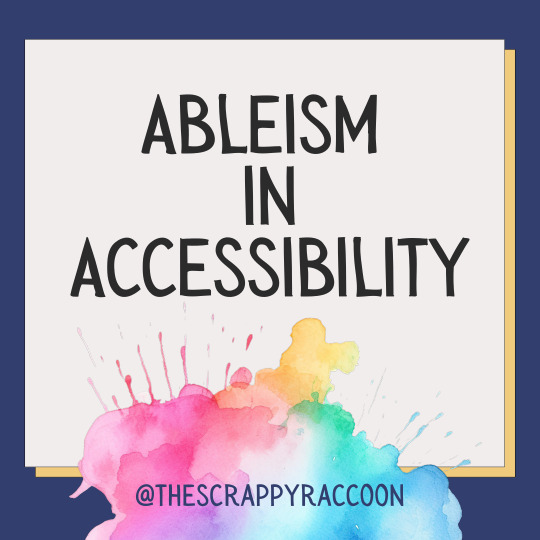
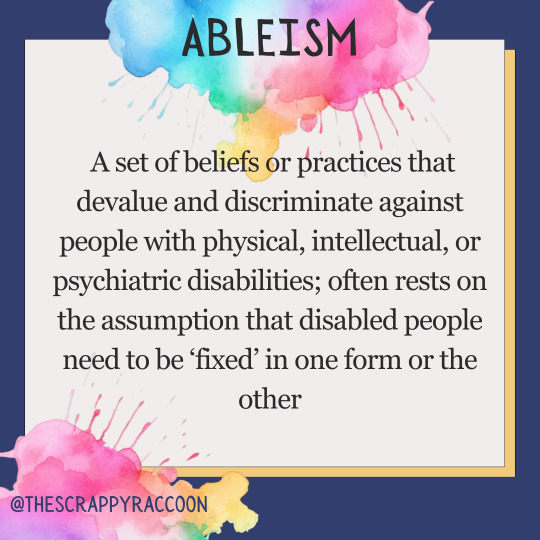
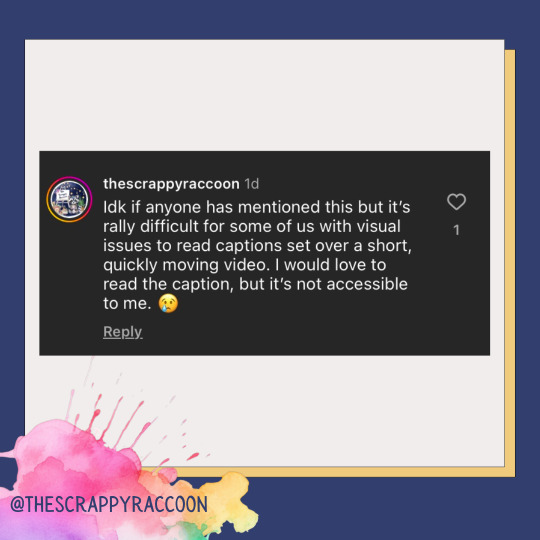
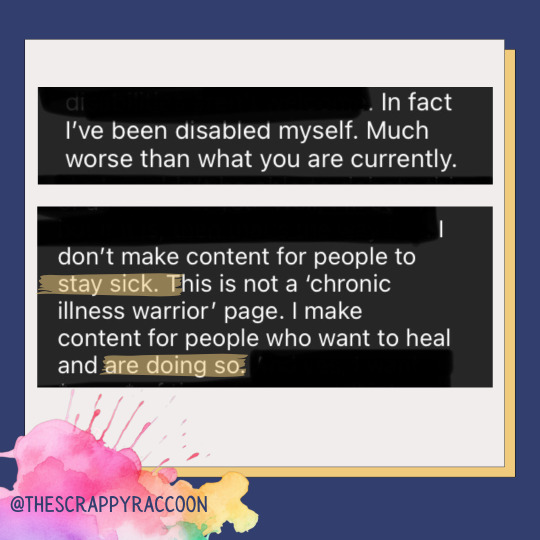
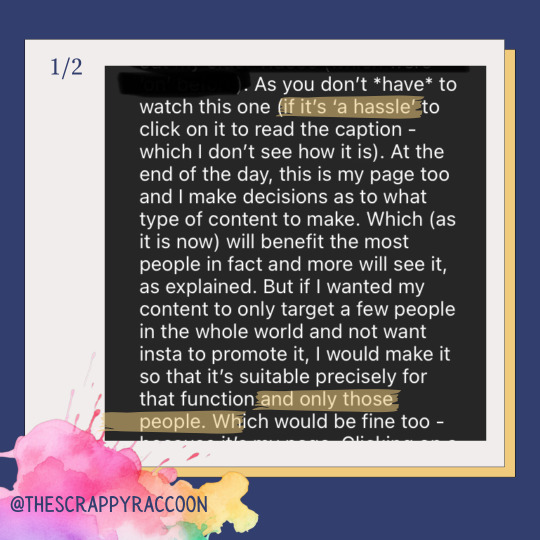
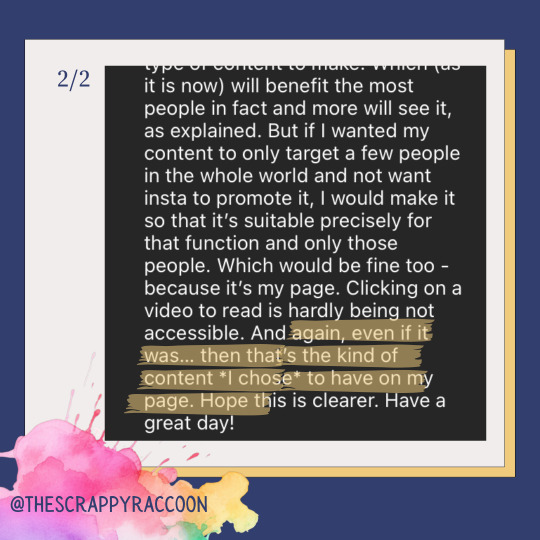
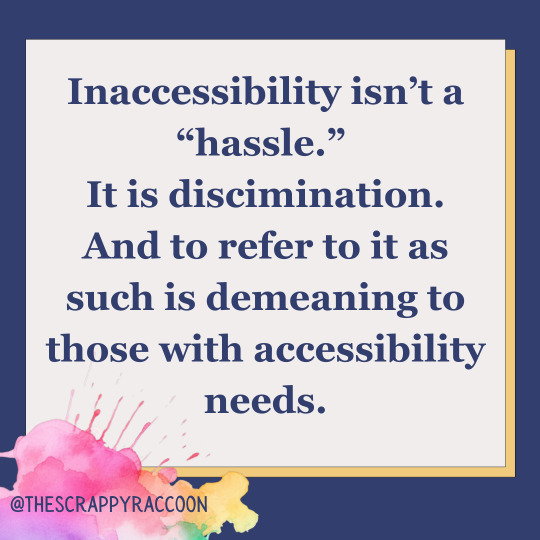


#accessibility#accessibilitymatters#disability#disabled#spoonie#chronically ill#chronic illness#ableism#ableist bullshit#fuck ableists#ableist nonsense#stop being ableist
21 notes
·
View notes
Text
Hi,
If you're a leftist/liberal or someone who in general considers yourself to be an "always learning" ally to marginalized communities then listen closely.
I've seen lots of people say they support xyz community because "they're human and deserve rights too" only to turn around and redirect that oppression on people who they see as "acceptable targets."
It's still not okay to be ableist, racist, fatphobic, etc to billionaires just because they're billionaires for example.
And when y'all do stuff like that it tells me, as someone who wants to dismantle oppression, is that Your idea of dismantling oppression just means using your privilege to oppress a different target. Your idea of dismantling oppression is not to Dismantle oppression at all, but to utilize it against someone else.
And thus, you aren't actually dismantling anything. In fact even as an ally you're still Refusing to let go of that authority and power you inherently have.
You're still Intending to cause harm. The only difference is that you're calling Musk fat instead of me. You still want "fat" to be a harmful word and you still want to use it.
Your idea of dismantling oppression allows you to maintain your power. Still allows you to control who deserves humanity or not. When you do stuff like this the only thing that changes is your definition of who deserves rights.
Which is exactly the problem, isn't it?
That you and the demographic of people like you have the power to control who gets treated humanely.
Which means you're not Actually learning and internalizing ANYTHING that BIPOC & queer folk have been telling you.
You don't get to choose who lives or dies. That's fascism. Nobody has that right.
It does not help anyone to say "you don't deserve this treatment" only to turn around and show us who does. Because one day your grandkids might disagree.
And we'll be right back at square 1 because instead of teaching your kids compassionate equality, you taught them to discern who deserves cruelty based on the whims of social capital and whoever is trendiest to shit on.
Your politics, your principles have no bone or muscle holding them up and you can see how easy they blow over at the slightest criticism.
Do better. Be consistent. Quit finding loopholes that allow you to maintain power.
No it's not "cool" to treat human beings as human beings, I know, I'm sorry, I know it's really in to be an asshole right now. I'm sorry for the FOMO you'll get from having to restrain yourselves from saying some classist-eugenics shit like "rich people should die/not have kids". I'm sorry that you'll seem like a buzzkill who takes things a little too serious if you say something the "it's okay to be inhuman to oppressors" crowd won't like, something like "men are Also victims of the patriarchy and deserve to speak on that experience without everyone trying to silence them."
They're gonna hate it and you know what? Good. It means you're doing something right.
Remind them why we do this, that we want better because we want to be treated with humanity. And if they think they can choose who deserves it then they haven't been listening well enough. When people have power to choose what others do or dont deserve we end up needing things Stonewall and the Civil Rights Movement. Because whether You think they deserve rights or humanity is irrelevant.
Everyone does. Objectively.
328 notes
·
View notes
Text
The stuff going on in the Law of Assumption community kinda takes me back to when I was a teenager and desperate to have actual social skills, and being attracted to ugly-duckling-to-swan stories like Gigi and The Princess Diaries. These narratives basically suggested that there was some easy way to transform myself into someone appealing and desirable; all I'd have to do was learn the Proper Etiquette and Curious Little Rules and bam, it could all be mine.
And like, at the time I was too young to really think about whether what the films depicted was really a good thing. I didn't have the context to understand how Mia's princess makeover was pushing certain Eurocentric beauty standards, or that the whole "yeah you can't really be a princess until you ditch the glasses" thing was kinda ableist. Not to mention, y'know, the whole girlboss feminism of it all, and upholding the idea that monarchy is desirable, and y'know, a lot of things that just don't occur to you when you're a teenage girl. (Nonbinary egg in my case, technically, but ya know.)
And today the LOA community is offering a similar thing, a kind of magic formula that'll supposedly allow all of these struggling teenagers sort out their lives, while pushing harmful beauty standards and advocating lifestyles that seem glamorous on the surface, but are actually just... terrible. Like the k-pop industry and modeling industry are horrifically exploitative, and the idea that the rich and famous are all fantastically happy people because they've manifested their best lives falls apart when you examine how much abuse goes on in Hollywood and how people like Donald Trump are incredibly insecure. Meghan Markle was so stressed out from the press that she and her husband left the UK.
And then of course, the LOA community pushes the idea that you can manifest all of these perfect lives that people on social media supposedly have. But the fact is, those social media doesn't show you reality; it shows you what the other person wants you to see. Those gorgeous pictures you see on Instagram are carefully staged and edited. A middle aged vlogger used filters to pass herself off as a young woman. One YouTube influencer decided to play a silly prank and claim that photos of herself taken in an IKEA store were actually taken in Bali - and to her surprise, her followers ate it up. Another influencer led people to think she was living this amazingly glamorous life when in reality, she was living in a filthy apartment. One influencer faked a hiking picture in her own back yard.
The Law of Assumption thrives among people who don't know a lot about the world yet, and don't realize that beautiful facades often conceal mundane to horrific realities. It thrives among people who don't have enough experience to consider that Neville Goddard, like many influencers of our time, might have just been lying.
I remember being that young and naive, and if I had come across something like this I might have been caught up in it. It's absolutely designed in a way that appeals to certain vulnerable young people, and that's what makes the whole thing so insidious.
If you are questioning or trying to get out of the LOA community and need help, please see this post.
50 notes
·
View notes
Note
Hi! I've been wanting to learn more about transabled folk so I'd like to ask you a few questions. I'd specifically like to know more about transautistic and what that means/is because I'm actually autistic. (If you're not transautistic I'm sorry I'm just asking a bunch of people the same thing)
Why do you want to be autistic?
Why do you want to be disabled?
How are you trying to be autistic?
How are you trying to be disabled?
Why don't you think it's insulting to pretend to be disabled?
Why don't you think it's insulting to pretend to be autistic?
Ok that's all my questions. Now I'd like to explain to you why it's hurtful to be transabled (specifically transautistic)
1.Actually autistic people suffer a lot
Because you're not actually autistic I wouldn't expect you to understand but, autistic people go through a lot. We are constantly misunderstood, we are constantly told we're disrespectful, communication can be very difficult, we get overstimulated easily and a lot.
Now I'm going to talk about my personal struggles that I have because of my autism. I struggle to eat and sleep because of my sensitivities. I struggle to work because I have meltdowns over really small things, which means that I don't want to work on (the thing that made me have a meltdown) and meltdowns are very emotionally and mentally draining so I don't have the energy to work after them. On bad days, 5 people talking in a room is TOO LOUD and will trigger a meltdown or shutdown. Because of my autism, ADHD, and possible NPD, I have some of the highest highs, when I feel unstoppable and invincible but because of my autism, ADHD and possible NPD, I have some of the lowest lows as well. When that happens, I can't move. I can't talk. I can't BREATHE. It's all too much.
By identifying as autistic, you insult the people who struggle because they're autistic.
2. Autistic people are actively discriminated against
There are so many shows, movies, books, etc that depict autistic people in hurtful and insulting ways. There are companies out there right now who want to "cure autism" (I'm talking about AutismSpeaks btw). They want to CURE us for being different. Many autistic people are forced through FUCKING TORTURE (ABA "therapy") because they're autistic.
And here YOU are. Identifying as autistic because it's "quirky and cool"
Fuck you and I hope you have a terrible day <3
hi! honestly, i was debating on responding to this, because you can't just start a conversation with 'i just want to learn', pepper it with wild accusations, and end it with 'fuck you'. but, even if i don't change your mind in the slightest, i can probably reach to others.
(three chunky paragraphs under the cut!)
first of all, i feel like your discomfort at and hate of transautistic people comes from the fact that you see being autistic or disabled as an inherently negative experience that no neurotypical or able bodied person in their right mind should want to go through. this, obviously, is wrong, and in my opinion more harmful than transautism itself. taking away autistic people's agency and just tell non-autistic people that the life of a neurodivergent person sucks so hard nobody should feel a connection does nothing but spread more ableist rhetoric. anyway,most of your questions can be answered by the fact that autistic people, though it's sometimes more difficult than neurotypical people, are just as capable as anybody else to have a happy and fulfilling life. and such, someone wanting to be autistic is not as utterly disgusting, insulting, and confusing as you think it is.
secondly, i was born neurodivergent and disabled and belonging to several other marginalized groups. i identify with transautism because i'm likely autistic, but because of how expensive getting therapy and all of that is, im not able to get a diagnosis. i struggle with meltdowns, sensory issues, social isolation, etc in a similar way to you. i struggle with seizures and such a big heat stroke risk that i can only go outside hours before the sun comes up. being able to get a diagnosis because of the economic class i was born in does not just magically make me a privileged neurotypical, able-bodied asshole. and honestly, most people in the transautistic community aren't privileged, neurotypical, or able-bodied either. if you float around the community for a little while, you'd start to realize that (/nsar)
and thirdly, and this is a bit of an aside, but you've got to learn how to phrase a question if you actually want to learn about this community. maybe you wrote it while in a fit of anger, i'm a bit frustrated writing this myself, but it sounds like you just wanted an excuse to white knight in someone's anon, lol. questions like "why don't you think it's insulting to pretend to be disabled?" and statements like "you only want to be autistic because you think it's quirky and cool" already put so many words into the recipient's mouth and so many assumptions into the world that anyone else in their right mind will just end up ignoring you.
hope this helps, if you ever even read it :3
#hopefully this isn't utterly unreadable#transid safe#transx safe#transautism safe#pro transautistic#transautistic safe#tw antitransautistic#long post
15 notes
·
View notes
Text
I don’t think using the term “narcissistic abuse” is ableist.
(addendum: if you are triggered by the usage of the term, please enforce a boundary for yourself to ignore posts like these (just like how I ignore posts that trigger me). I am not wishing harm on anyone. I am working on healing, moving on, and also forgiving people - but it does not change what happened.)
Ableism is the blatant discrimination of those with disabilities - calling the abuse cycle by its term (there is no other term that accurately describes what I went through) is not ableist. Just like calling me autistic is not ableist. Just like calling out my previous codependency and people-pleasing that caused me to chronically lie to people is not ableist.
The term is DESCRIPTIVE and it is indicative of a real thing that happens.
I know other people think that it is ableist.
I know people won’t believe me when I say it saved my life.
You know how no matter what you do or say, someone will find issue with it? Doesn’t matter how many degrees you have, the amount of medical validation you have received, the things you have witnessed, the insistence that I am not proposing harm to anyone (I am insisting on accountability though!), etc.
There are people who will not believe you or take it personally.
The lesson I have learned: I need to trust myself with the information I have right now. I can continue to learn more about people and the world, but I am not responsible for people thinking that my usage of a term is vilifying a whole community. I have faced this my entire life (telling white people about white supremacy and appropriation and then having them accuse me of vilifying all white people; countless other black-and-white examples).
So whatever.
Call me a monster.
After all my abuser probably calls me one.
#healing#trauma#neurodivergence#queer#cw narcissism#narcissism#narcissistic abuse#what I went through was real#I guess I’m a monster now#I don’t think it’s ableist for real#I’m autistic#I have adhd#I have been emotionally and/or physically abused my whole life#I thought my ex-spouse loved me#but they were emotionally abusing and playing me the entire time without getting help
41 notes
·
View notes
Text
Accessibility and the Rise of Ableism as a buzz word
I really get so angry at people using ableism as a buzz word to ignore the actual needs of my community.
Instead of, maybe asking us, people assert a claim about what they think we need.
The current debate on NaNoWriMo is a good example of that. Their assertion about LLM/Generative AI discussion having ableist undertones is an example of someone using ableism as a buzz word without a proper examination of the actual issues that impact a community.
It makes assumptions about what people with specific disabilities are able and aren't able to do, which is ableist in of itself. It's not meant to actually be helpful for disabled people, but to silence our worries by claiming that a "tool exists already" as if this tool can replace our need for human community and support.
This digs into the much LARGER debate about how tech companies and so-called "innovators" will not listen to the communities they claim to be "innovating for." Thus, they end up making items that don't solve my community's needs. Instead, these devices often cause more harm, are taking funding away from products (or designs we may make ourselves) that actually help us thus causing more harm, and overall makes it more difficult to push for equitable and accessible revamping of ableist systems.
Disabled people are a diverse bunch for sure as anyone can be disabled for any reason and at any time in their life. Disabled people come in all ethnicities, races, classes, genders, sexual orientations, etc.
But there are still some commonalities when it comes to which illnesses and/or disabilities we may be discussing for a specific need.
For example, those of us who use wheelchairs need the environment itself to be built in a more accommodating way. We need more ramps, we need more easily opened doors, we need less hostile architecture.
We Do Not Need A Wheelchair That Can Climb Stairs. Often those things are deathtraps to start, and very rarely include us in the design process. It also disguises the very real problem of hostile architecture by slapping a mediocre and badly designed "tech solution" as a band-aid, as if that will actually solve all our problems. (Spoiler, it won't.) It takes funding away from redesigning architecture in a less hostile way, and it hijacks the discussion away from our needs and toward the so-called tech solution.
Technology can be helpful for us, yes, but what we need requires our input in order to produce a design that can actually assist the majority of us that has that particular disability.
This is where using ableism as a buzz word becomes such a major problem. In order to determine whether a person has engaged in good faith about the claim of ableism, we need to examine the underlying assumptions about that claim and see if they utilize an ableist framework.
To aid us, here's some definitions.
Abled-bodied person is a person who is not disabled. As in they have no physical or mental disabilities. Or they are someone who does not identify as disabled because any mental illness or physical illness they have does not negatively impact their life enough for them to notice (this person may have unresolved internalized ableism).
Disabled person is a person with a physical or mental (or learning) disability. People often identify as disabled. Please do not use “differently abled” as that was a term introduced by abled-bodied people and most disabled people in our community dislike the term as it others us.
Ableism is discrimination, bigotry, infantalism, and prejudice against disabled people.
Ableist framework is a narrative that demeans disabled people and puts them in a lower caste than the rest of society. This is common in a capitalist lifestyle, which is the idea that we can all make it if we work hard regardless of our health or mental wellness. Many a problematic narrative is rooted in this idea of productivity being the sole value of human worth, which is an ableist framing. Some disabled people cannot fit the parameters of what qualifies as “work” in a capitalist society, and thus they are deemed “unproductive” by society. This “unproductive” status puts them in a lower tier, where they are assumed to have no quality of life. Again, this is the root of Ableist Framing.
Now to expand on my examples.
For the wheelchair that can climb chairs, the innovator may claim criticism of the wheelchair has ableist undertones.
However, if we look more closely at the actual discussion about the wheelchair; we'll see very real concerns about how top heavy it is and prone to tipping over, how the mechanical parts can trap limbs and crush them, and other problems that can cause bodily harm to the disabled person using said item. In this instance, we see the criticisms are indeed valid, and that 'ableist undertone' was used as a buzz word to avoid the harm of the "innovation" and to avoid a discussion about what it is that wheelchair-users actually need.
In the case of NaNoWriMo, instead of actually engaging in people's very real concerns about the unethical nature of LLM/generative AI and its impact on the writing community; they used ableism as a buzz word to silence that criticism.
In the case of NaNoWriMo, instead of actually engaging in people's very real concerns about the unethical nature of LLM/generative AI and its impact on the writing community; they used ableism as a buzz word to silence that criticism. In their own words, they call the discussion of "artificial intelligence has undertones of ableism and classicism." When we dig deeper, NaNoWriMo uses ableist claims about disabled and lower income folks to try to defend their generative AI nonsense. The example I'll speak to is one that impacts me, that of people, who are either neurodivergent and/or with brain injuries and/or illnesses that impact the brain.
However, this is rooted in several harmful assumptions about what people with those illnesses and injuries can or cannot do. Thus, in an attempt to stop criticism of their actions, they engage in an ableist framework that presents specific disabled people as being unable to do the act of writing ourselves and thus requiring a novel tech solution to solve our issues.
People with these injuries and illnesses can and often do write, but what they truly need isn't some novel tech solution like ChatGPT.
As a side note, I won't go into the major problems with LLM/generative AI such as their unethical datasets; burying human authors and making it harder to discover us; harmful environmental impact where billions of gallons of water is used yearly and harms watersheds and water access; difficulty in phrasing prompts to get an output that is coherent; hallucinations (as in unreliable output data); misinformation; stealing our works to fuel the unethical datasets; etc. Others articulate that well; I just want to speak to the use of ableism in their statements. (To see a good analysis of NaNoWriMo, see this video by D'Angelo.)
What we need is the support of a human community. Better access to resources in general (such as Internet and/or data plans, which are expensive and a lot of low-income people do not have access to reliable services) or devices that fit our needs. For example, for myself, I often have friends who will help with editing for free or a fee I can afford. I also always use dark mode and text-to-speech software. Others may need software or devices that has dsylexic fonts, high or low contrasts, little to no blue light, dark modes, dictation programs, tablets like Remarkable or Kobo where you handwrite and it transforms it into text, etc.
Instead of discussing it with people within that community, they used ableism as a buzzword to silence their critics and then justify their harmful actions without any real regard for the actual impact to my community.
That is the problem with these people who do not engage in discussions with the communities they claim they are "helping" or "supporting." They instead speak for us as if they know us better than we know ourselves, which is also an ableist framework.
Disabled people are often poor because of how our society's ableist framework makes it near impossible for us to exist in society and receive the care we need for survival. This means we may not have access to reliable Internet or data plans that can handle heavy data loads, so it is classicist to assume we are able to access software that relies on reliable and heavy-data Internet and data plans.
So how can we approach this in a more nuanced way?
For one, talk to disabled people from that community and try to include a diversified sample from all sorts of races, ethnicities, classes, genders, etc.
We need ethical and accessible designs that includes us, as well as making these tools cheaper to access. For example, Diction software or Handwriting-to-text can be irritatingly expensive to find ones that are fairly accurate. The licensing of these types of software can be expensive too, so building up accurate, free and open-source alternatives would be lovely. This way we can use our own words spoken by us (or handwritten on the tablet).
We need a community of people that support us through a diversity of ways (emotionally, physically, intellectually, etc.) As in we need to stop isolating disabled people, and instead include us more holistically. To build up communities of care, where human beings work together to swap skills and help one another build what they envision.
We need society/orgs/people to listen to us and respect us as equally valid as their own selves. To stop speaking for us and allow us to speak about our needs. To stop assuming disabled people can't use their brain at all. To stop assuming we have no skills.
We need society to be more accessible and to center accessibility from the get-go. We need to expand the definition of accessibility to include not just physical spaces, but to include information, transportation, justice, sensory, etc.
We need accessible and cheap/free housing. clean water, clean air, and food.
What we do not need is people using us as a shield in order to silence criticism.
I wrote this article on my blog awhile back, but I'll resurrect it here:
Introduction
when i ask for accessibility as a disabled person, most abled-bodied (as in non-disabled people) assume that means if the ‘physical space’ is accessible for mobility reasons. it’s a common and not entirely accurate assumption of the ask itself. we are taught to view accessibility only as physical space adjustments, but this is not the only meaning of the word ‘accessible’ and it erases the diverse needs within the disability community.
the needs within the disability community can also improve the lives of those who aren’t disabled; accessibility is about justice for all people, where we create an multi-layered environment that is accessible not just transport-mobility-wise or physical-space-wise but also information-wise and multiple-role-wise.
what do i mean by multi-layered accessibility?
accessibility is about movement through the multi-layered spaces within our society. it’s about mobility.
mobility through physical space, information space, community space, intellectual/engagement/labor space, sensory space, transport space, time-independent space, and justice space.
mobility is the way we move in society whether physically through spaces such as buildings or streets. mobility is also how we move figuratively through community relationships.
mobility is how easy it is for us to access information and share information. another form of mobility is the roles we have in a community or in a movement — those roles provide emotional and intellectual spaces where people can exist based on their gifts.
so mobility justice and accessibility is a multi-layered space that exists not just in physical/transport space but also in community-space and information-space and sensory and intellectual/labor space.
we need to be cognizant of these multi-layers when creating events and movements so that we can be accessible to our most vulnerable members of the community.
so when a disabled person asks if something is accessible, we aren’t just asking if we can navigate to and from the event, or if we can understand the information presented (such as is there interpreters, etc), but also if there is a role we can exist within to further the goals of the movement as well as information about the movement and/or event that is easy to access and share.
Community Care and Accessibility
community care is also reliant on accessibility from a mobility justice framework. we cannot care for one another unless we find ways to center accessibility so that all people feel able to access support systems that may meet the multitude of needs in a diverse community.
to build up community care so that these diverse needs can be explored for possible accessible services and care practices is crucial to the goal of mutual aid efforts and the idea of community care itself.
accessibility is a gift not an add-on. it is a gift that provides a multitude of avenues for people to participate in ways that fits their abilities and energy levels.
if we reframe how we view accessibility, where we see it as a gift that creates more depth and space for all to exist and participate, then we can revolutionize our approach to community and building movements. centering accessibility — and its multi-layered definition that goes beyond just physical space — is crucial to liberation of all people.
our most vulnerable populations are Black disabled trans people, and thus accessibility also needs to be examined from their viewpoint in order to best meet their needs.
when we view and create access with our most vulnerable populations, we are creating a multi-layered space that is accessible for all people, as it is when our most vulnerable populations needs are met that all needs will be met as well.
that theory of building up has shown to be helpful especially in many Black Lives Matter groups around the country and in Indigenous groups, where their centering of the most vulnerable populations often created a fluid accessible multi-layered space that is held accountable to the needs of those communities. it created a creative and dynamic space for the diversity of people to exist.
to remind, the disability community is a vastly diverse community of so many different genders, sexual orientations, races, ethnicities, etc — to center accessibility and the multi-layered tenants of mobility/disability justice means opening up community and movements to a diverse and gifted group of people. it nourishes and inspires more creative ways of existing in relationship with one another.
may we learn and seek understanding. may we hear the voices of the vulnerable and seek to meet their needs. may we create community systems that are accountable to one another and care for one another as we are. may we listen and grow and uplift one another in the work we do.
_________
Crafting Accessible Spaces: Questions to Consider as Examples
I typed up the following guide for a friend to assist them with what questions to consider when centering accessibility at their event. May it help all of you as well.
Do you have any questions to add to any of the categories that I may have missed? Is there further details on a suggestion that I could add? Let me know in the comments! I’ll edit this post as needed.
physical space:
is the area accessible for limited-mobility folks? As in can we reach it and navigate through it easily?
Are doors easy to open? Is there ramps? Is there elevators or wheelchair lifts that are easy to access?
Is there benches or chairs or places for people to rest if walking/wheeling is involved?
Is there air filtration units to help clean the air? Is masking with N95s mandatory to make sure immuno-compromised people can attend safely?
If there are speakers, can everyone in the audience hear the speaker? If not, how can the physical space be adjusted so people can hear better or see the interpreter better?
How do you present any slides — is that easily seen by the entire audience?
information space:
are your materials easy to read? As in avoid jarring color combinations or too small font.
Are there interpreters if there are speakers? (This includes ASL as well as spoken languages).
Do you require everyone to include pronouns in their introductions? (You should.)
Do you have speakers provide a brief description of themselves in introductions for those who are blind? Is there descriptions of pictures (such as those used in slideshows or in videos) that blind people can access easily?
Does your online materials have alt-text and/or captions for those with sight and hearing disabilities?
Is information on accessibility easily available in your event invites?
Is the information translated into a language that is understandable by one’s audience? (This includes adjusting words used based on culture as well as different spoken languages).
community space:
How are you engaging the affected communities?
In what ways are you engaging in mutual aid for those that may attend? (such as meeting their needs in the other intersecting accessibility spaces I listed here).
In what ways are the needs of the community being listened to and addressed? Have accessible discussion spaces for community to provide feedback. Include the community in collaboration on how to create the access they need to fully engage with society and with one another.
Is the community walkable (or wheelable with a wheelchair/mobility aids)? Is the sidewalks easy to traverse? Is needed services nearby? Is there a way to create a mixed zoned neighborhood so that the community can access the food, healthcare, parks, etc to fully engage one another and the city at large? To be able to access events within the town?
Is there pandemic mitigation strategies to make sure people are able to safely convene without large risks to their health? (This means mandatory masking with N95 or better, air filtration units like HEPA filters or Corsi-Rosenthal boxes in each room, good ventilation systems, having the event outside, washing hands and using hand sanitizers. Strategies that are multi-layered are the safest for all people).
intellectual/engagement/labor space:
How are you utilizing/leveraging the gifts of the disabled community?
Are you sharing materials made by disabled people and providing compensation for their labor? Are you compensating the labor of disabled folks advising your event?
Is compensation possible – why or why not? What would compensation look like ideally? Is the idea of compensation preventing you from utilizing the gifts of disabled people? Why is that?
In what ways can you leverage those gifts to avoid tokenizing and/or erasure?
sensory space:
Do you have a space cordoned off for those that may get sensory overloaded to cool down? (This will allow them to “take a break” to cool down and then return to the event. The spot needs to be away from loud noises, dimly lit if possible, and be easily entered.)
Do you have content notes/trigger warnings written into your scripts? (This allows people who have panic attacks to determine their level of engagement, and if they need to temporary exit to recover).
Do you make sure that no strong scents dominate the area or that there are alternate food or drink that accommodates intolerances/food allergies?
Do you allow adequate time between speakers for people to process what was said? (Having speakers back to back without at minimum a two or three minute break can be exhausting for some disabled folks).
Do you have materials set up for deaf or visually impaired folks to access the materials and understand content?
transport space:
how do people reach your event? Is there an easy to find parking area and accessible walkway to your event?
For those that may not be able to drive themselves, are you near a bus line or have a ride system?
Do you have a way for people to make it safely home if they find they are too exhausted to drive themselves? (Safety drivers – give them a vest to make them easy to see. Give them a short training before the event on how to respond when approached for a ride home, and how to ask consent before offering to assist a disabled person into or out of the car)
Is this information easily available in your event invites?
time-independent space:
Does your event have a way to capture and share what transpired so others can view at a later date?
Is there a way to make breaks and the timing of the event flexible for those with various disabilities?
justice space:
do you have plans on how to adjust your event to meet the needs of disabled people? How can you collaborate with the community to enact these plans? (Keeping the community in the loop, so they can offer insight can avoid harmful blunders/accidents later down the road).
For example, while going through the above questions, if you find something you need to tweak or alter to provide that space for disabled folks, is that something you are willing to do? Why or why not? What is stopping you?
Did you create take-aways for people to take home that informs them of the event’s goals and aspirations? Is there suggestions on how people can virtually or physically assist your organizations and/or events goals? (Make these easy bullet points. For example, ‘write a letter to x senator. here is a script you can use.’ or ‘donate to z fund to aid political prisoners’)
Is there ways to lead people toward justice and liberation through the above accessible materials, discussions, events, etc?
When you enact the plans for improving accessibility within your city/town/group, do you collaborate with the impacted community and keep them informed? Allow them to assist with enacting the plans?
_________
Bibliography of Sorts
these ideas and definitions are based on the writings of disabled people such as myself, Alice Wong, Imani Barbarin, Matthew Cortland, A. H. Reaume, and other disability activists as well as conversations with local disabled activists.
Books:
Disability Visibility: First Person Stories from the Twenty-First Century edited by Alice Wong
Mobility Justice by Mimi Sheller
Care Work: Dreaming of Disability Justice by Leah Lakshmi Piepzna-Samarasinha
Disfigured: On Fairy Tales, Disability, and Making Space By Amanda Leduc.
Black Disability Politics by Sami Schalk (free access book)
A People's Guide to Abolition and Disability Justice by Katie Tastrom
Design Justice Community-Led Practices to Build the Worlds We Need by Sasha Costanza–chock
Building Access Universal Design and the Politics of Disability by Aimi Hamraie
Restricted Access Media Disability and the Politics of Participation by Elizabeth Ellcessor
Crip Spacetime: Access, Failure, and Accountability in Academic Life by Margaret Price
Accessibility for Everyone by Laura Kalbag
A Disability History of the United States by Kim E. Nielsen
Surviving the Future: Abolitionist Queer Strategies by Scott Branson, Raven Hudson, and Bry Reed
Crisis and Care: Queer Activist Responses to a Global Pandemic edited by Adrian Shanker
Stairs and Whispers: D/deaf and Disabled Poets Write Back Edited by Sarah Alland, Khairani Barokka, and Daniel Sluman
Crip Kinship: The Disability Justice & Art Activism of Sins Invalid by Shayda Kafai
The Future Is Disabled: Prophecies, Love Notes and Mourning Songs by Leah Lakshmi Piepzna-Samarasinha
Articles:
On Reclaiming Brokenness and Refusing the Violence of ‘Recovery’ Narratives”
How Colonial Visual Cultures Have Worsened This Pandemic and What Needs to change
10 Principles of Disability Justice by Sins Invalid
Accessible Activism Guide
What to do When Your Disability Keeps You From Writing?
#Disability#disability justice#disabled#disabilities#invisible disability#disability rights#actually disabled#ableism#ableist frameworks#Discussing ableism as a buzz word to avoid criticism#Updated the write-up to be more robust in the sections about what disabled people may need
15 notes
·
View notes
Note
yeah it kinda sucks how like. Liberal Zionists (tributary, for example) will engage in genocide denial or argue the threat of Hamas is so big it warrants mass killing and then pivot to saying stuff about how people respond to being relatively powerless in the face of atrocity by getting morally righteous at other people online. Because they’re right, that’s a thing some people do, but it also retroactively frames everyone getting mad at them for the genocide both sides rhetoric as whiney babies. Very annoying
so i dont think tributary (to my knowledge) specifically has been engaging in rhetoric thats like "hamas warrants mass killings," i think they've been consistent about not wanting mass killings (again, to my knowledge) just wanted to clear that up and to not attribute things they did not say to them.
With what i see sometimes is that these types of people where they're like "stop being morally righteous at other people online" is that they fail to understand for palestinians this is literally a matter of life or death with rhetoric being spread because a lot of the time, they're used to justify our killings OR to justify our oppression.
Because like, I do things that are. Not online lol, I am active in my community. To retroactively label me, for example, as someone who just stays online (which, i've talked about this before on this blog, is kinda ableist in that it assumes that people can leave the house in the middle of a pandemic to participate in physical resistance + they aren't using online tools to organize within their communities) and judges other people for "not using the right language" when language is the primary qualifier for enabling genocide and violence is frankly pretty insulting and dismissive of the main victim's concerns.
Both sides rhetoric is harmful because its not new. It's literally how Palestinians grow up all over the world. We literally learn "both sides" as the primary viewpoint of our lives that we have to work around. So we're sensitive to these things because, again, we see it to justify our oppression or to silence us. Rhetoric that's like "i want peace and love" is so harmful because people assume its an issue where they just are so mean to each other for no reason when Palestinians face structural violence that erases them CONSISTENTLY since '48.
The erasure and prevention in allowing us to speak for ourselves or to spread information about ourselves is actually one of the key reasons we're at this point. For the first like... 20+ years after the Nakba, Palestinians were just blatantly ignored. Like, Balfour ignored us in the Balfour Declaration completely. Security Council Resolution 242 doesn't mention Palestinians AT ALL despite them being the primary cause of it's inception.
So yeah, erasure is a part of the issue, actually, I would argue its a key part and by perpetuating that (ie: encouraging defining zionism by excluding palestinians from the discussion in citation or any other material way) is in fact enabling our oppression.
53 notes
·
View notes
Note
hi so ive been reading a lot of your mad liberation stuff (i think thats the term i cant actually remember atm) and im having trouble understanding some of it so i want to like ask this for clarification
is it like. not quite antirecovery but that "recovery" shouldnt be the default? like mad ppl should be able to live as is, and if they want to seek recovery they can but shouldnt be looked down on for not doing that?
or that like. "recovery" doesnt look like psychiatric definitions?
sorry i dont know if im phrasing things right im pretty dissociated lol
ty for your time tho!
hi anon!
I'm always happy to answer clarification questions. I know when I was first learning about antipsych stuff, there were so many terms and concepts that were new to me, and I'm always still learning more.
A lot of what you've said is stuff I agree with! When I'm thinking about the concept of recovery, it feels important to me to really analyze what people really mean when they say "recovery" in the current psych system. I might ask questions like:
Who gets to define recovery? Is the mad/mentally ill/neurodivergent person supported in setting their own priorities and goals, or is the only thing prioritized the mental health professional's ideas about wellness?
How do ableist concepts of normality and conformity contribute to our ideas about recovery? What ways might recovery frameworks get in the way of radical acceptance of mad/MI/ND people's traits? How do ideas of recovery contribute to stigma and violence against mad/MI/ND people?
What ways does the psych system enforce recovery, even at the cost of bodily autonomy and freedom? What ways does psych treatment use violence to enforce recovery?
Within the current psych system, I think that "recovery" is not a neutral concept, and I think it's one that contributes to a lot of fucked up patterns within the psych system. There's so many ableist and sanist ideas that label mad/MI/ND people just existing as a threat, and force cure on us instead of building a society that embraces madness/MI/ND. The language about being a "danger to yourself and others" reveals the ways that mad/MI/ND people are often labeled as inherently unsafe if we're existing in public, if we have nonconforming behaviors, if we talk to ourselves in public, if we stim, etc. There's this pattern set up within the psych system where unless we're actively compliant with treatment, unless we're institutionalized, unless we're taking our meds and going to therapy and doing every little thing the psych system asks us to, we're labeled as dangerous and unstable.
In a system where "treatment" is often violent, coercive, and oppressive, I think that the way recovery is defined is a really harmful framework. Recovery in the psych system is more about compliance then it is about actually listening to our needs. It treats mad/MI/ND people as unworthy unless we're doing every single thing that the psych system wants us to. And I think that mindset is super damaging to mad/MI/ND people. It makes us feel like we're not deserving of support, care, accommodations, and community unless we're willing to give up our autonomy, conform to ableist ideals about "normal" behavior, and give up so much of ourselves. I'm much more interested in separating morality from our ideas of health and wellness, meeting people where they're at, and embracing the idea that it is totally fine to exist openly and fully as a mad person. We do not have to change ourselves in ways we don't want to. My mad community is always going to be one that embraces + prioritizes people who have no interest in recovery, who want and need to keep using behaviors labeled as dangerous, odd, and crazy, who don't comply with treatment and who demand the right to exist anyway.
I think that as mad/MI/ND people, we should have the room to define healing/coping/resistance/resilience/care in a way that is affirming and supportive for us, instead of just being restricted to "recovery." Our distress, pain, and hurt is very real, and we deserve support, skills, resources to help us navigate that in a way where we aren't shamed and aren't forced into coercive treatment. We should be able to set our own goals and priorities about what actually feels important for us in making our lives better/more tolerable. I'm not super interested in telling mad/MI/ND people to stop using the term recovery because I think for a lot of people it's a familiar shorthand to sort of describe a lot of different ways of healing. But I think it really is worth critiquing the concept, doing self inquiry about what it actually means to us, and analyzing the ways we use recovery in our communities and who that might exclude.
Personally, I don't like to use recovery language around a lot of my own madness, because it's important to me to be able to validate and affirm the ways I exist as a crazy person in the world. I think of my bipolar & psychosis as fundamental ways that I engage with the world, and I'm really glad that those are the ways I experience my life. I don't think of my bipolar and psychosis as a transient state that I will "recover" from and wake up one day and have all that taken away from me. I find a lot of value and meaning in my psychosis and my mood cycles, and I think I would lose a lot if I no longer experienced them. At the same time, there are ways that my psychosis and bipolar have changed the way my bad days look, ways that my self harm has really caused me a lot of distress and was really debilitating, and ways that my relationship with suicide is incredibly, incredibly difficult. I've been able to find support, healing, and care from places outside the psych system in a way that feels more meaningful for me than the psychiatric systems definition of recovery. Every time I go into the mental health system and try to express that I don't want to stop having hallucinations, that I want to use harm reduction for my self harm, and that I don't want to go on meds, I am labeled as noncompliant, antirecovery, dangerous, and incapable of living outside of institutions. This is despite the fact that I have worked really hard in building up a support system, access tons of resources, have found a bunch of coping strategies that work for me, and have built a life that accommodates my madness.
So to answer your question, I am against the ideas the recovery should be the default and I am really critical of the way the psych system uses recovery as a foundation for coercive treatment, but I fully support mad/MI/ND people's right to find healing, support, resistance, care, coping skills, resources in whatever way makes sense to them and fits with their needs and autonomy.
Summary: The current concept of recovery in our mental health system is based on ableist ideas about normality and labels mad/MI/ND as dangerous for just existing as mad people. Coercive treatment like psych wards tries to force ideas about recovery onto all mad/MI/ND people, and makes us feel like we are unworthy if we aren't doing everything we can to be compliant. Mad/MI/ND people have the right to define what healing/coping/resistance/care means to them, and if that means rejecting ideas of recovery, treatment, and conformity, our autonomy should be respected.
Feel free to ask any other questions!
#asks#antipsych#antipsychiatry#psych abolition#mad liberation#self harm mention tw#suicide mention tw#other antipsych mutuals if anyone wants to add on what being antirecovery might mean to u. feel free!#i don't usually use the language 'antirecovery' on tumblr because i think it's pretty associated with fatphobic pro ana content on here#but i do think antirecovery like i've laid out on this post is super important to me!
55 notes
·
View notes